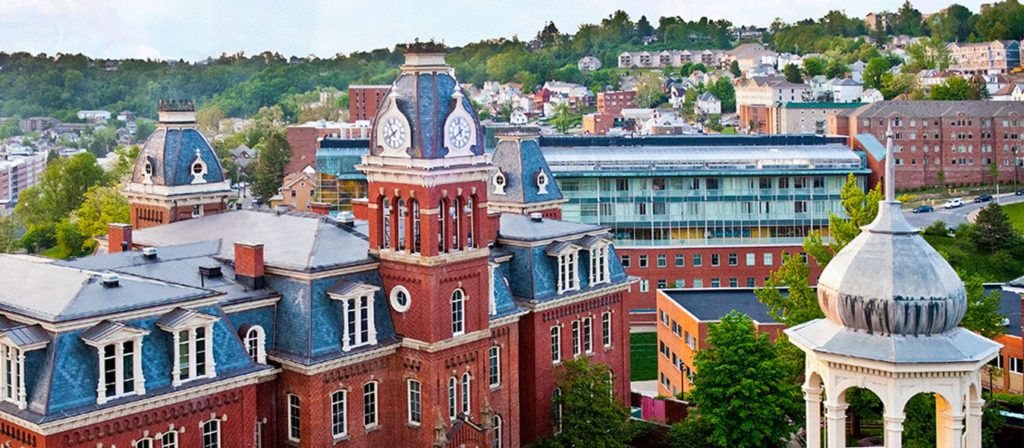West Virginia University’s inaugural Research Week is more than a showcase of the work done at the state’s only R1 Research Institute; it’s a celebration of the faculty and students across campus who pursue ground-breaking research in all disciplines.
Whether they are mapping the universe, exploring the roots of historical fascist movements,
developing treatments for life-threatening diseases, examining issues of identity in African-American art or pioneering solutions to the effects of climate change, our researchers are engaged in changing the world for the better.
While many universities see research as science-focused, WVU seeks balance in its students’ lives with a mission to “cultivate critical humanistic inquiry to benefit the common good of the university, state and the world.”
“Our humanities researchers are like intellectual scouts—we may roam to distant and obscure spaces to try to understand deep patterns in culture or old root causes of social problems,” said Ryan Claycomb, acting dean of the Honors College and the director of the WVU Humanities Center. “But those patterns and causes form the basis for real impacts at the level of culture and society. That research points us to how we do more than just survive, but how we truly flourish.”
Two presenters from the National Academy of Sciences will follow through with that purpose by sharing the findings of recent studies concerning “Graduate STEM Education for the 21st Century”and “The Integration of the Humanities and the Arts with Sciences, Engineering, and Medicine in Higher Education” in open forums with faculty and graduate students at the Erickson Alumni Center April 2.
This NAS visit will be one of the highlights of the week for Vice President for WVU Research Fred King.
“The nature of research is changing to address larger societal problems that no longer lend themselves to solution from a single discipline or perspective. They are complex and require interdisciplinary teams to be most effective,” he said. King pointed to the state’s opioid crisis as an example of such problems, noting that WVU’s “research with a purpose” melds the science of understanding and treating of addiction with the arts to create an environment that fosters healing.
Throughout the week, the WVU Libraries will offer a wide range of research-focused workshops, training researchers on how to manage their profiles, find new collaborators and mine text. Research Support Showcases offered on both the downtown and Evansdale campuses (April 3 and 4, respectively) will spotlight resources and programs that support faculty research, including scholarly communications and publishing services, WVU Centers and avenues for securing funding.
“WVU Research Week will be an exciting time to collectively celebrate the diversity of the work that is done at the University and, importantly, all the members of the teams that contribute to the creativity, innovation and impact,” said Laura Gibson, professor, senior associate vice president for Research and Graduate Education and associate dean for research at the WVU School of Medicine. “It is never just the principal investigator driving a project and it’s exciting that the event highlights a range of varied disciplines, amazing trainees, top notch resources across the campus and support staff who make it all happen.”
Provost and Vice President for Academic Affairs Joyce McConnell said she hopes Research Week will become a tradition at WVU, celebrating “extraordinary people doing extraordinary work.”
“We should seize more opportunities to celebrate the achievements being made here,” McConnell said. “It’s exciting to see teachers and students together talking about their work, the idea that there’s this immediate partnership. It’s unusual for freshmen to be involved in research, but that’s exactly what we’re doing. We’re ‘all in.’”
The week begins with a convening of the University’s Fulbright Scholars, followed by informational panels for faculty, staff and students interested in pursuing Fulbright opportunities around the world.
More WVU Research Week highlights:
• Academic Media Day, April 1, 10 a.m. to 4 p.m., Erickson Alumni Center
• WVU graduate students from a variety of disciplines will compete for cash awards in the annual Three-Minute Thesis Competition Finals, April 4, 6-8 pm, MountainLair Ballrooms
• As part of the Cancer Institute’s interdisciplinary Science Exchange lecture series, faculty members Nick Wu and Peng Li will present “Nanomedicine: Optical Detection Imaging and Treatment of Cancer” April 5 from noon to 1 p.m. in Health Sciences North.
The week will not be all work and no play, though. On Friday, April 5, the campus community is invited to celebrate WVU’s research enterprise and achievements with coffee, doughnuts and camaraderie in the morning (Evansdale Library Plaza, 9-10 a.m.) and ice cream in the afternoon (Mountainlair Green, 1:30-3 p.m.).
See the full Research Week schedule and RSVP for Research Week events.
Originally from University Relations for WVU Today.
